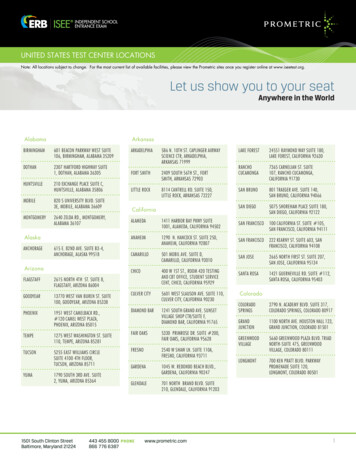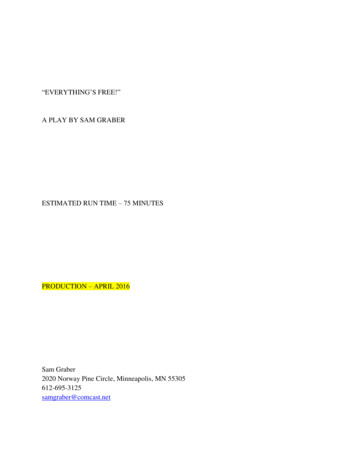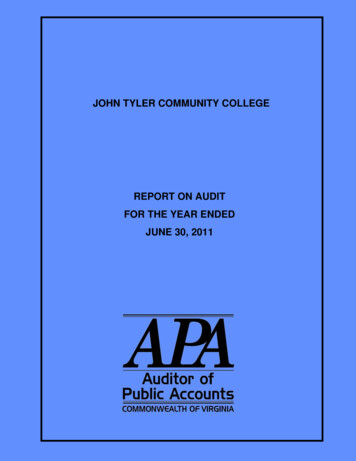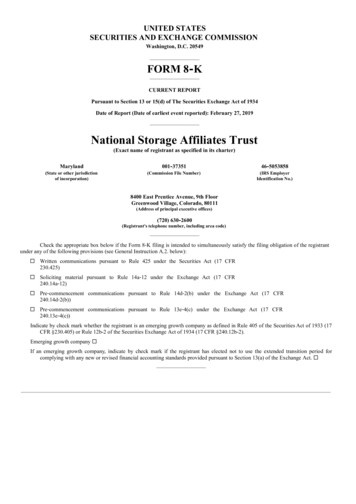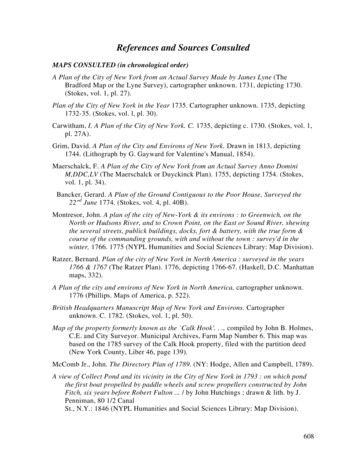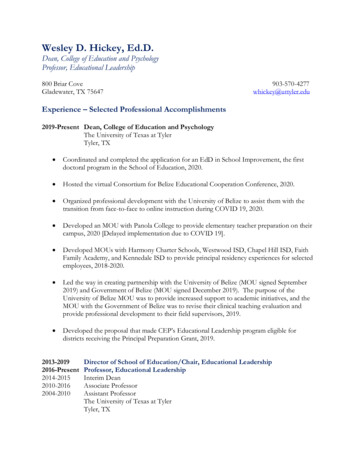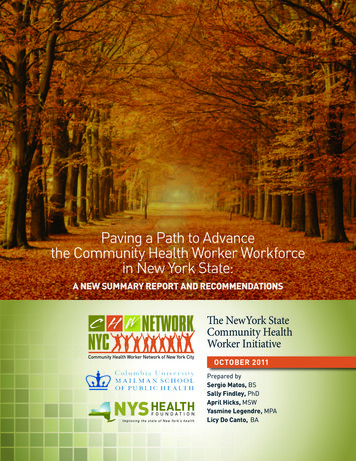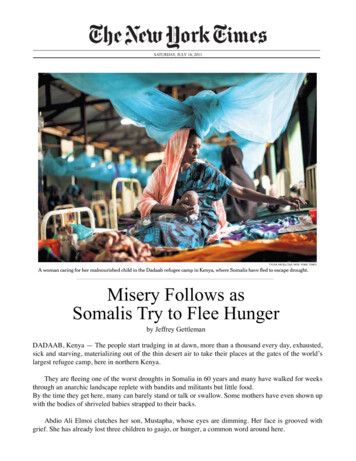
Transcription
. No. 55,468 2011 The New York TimesSATURDAY, JULY 16, 2011SATURDAY, JULY 16, 2011MOVINGAS TALKSGET STALL2 TOP OFFLEAVE NEWIN PRESSALS SUPPORTAPOLOGIES Bublic’s on Hissident StillBig Deal’Crisis ClaimExecutive aU.S. PubBy JOHN Fand JEREMYE CALMESL HULSELONDON — ThRupert Murdoch’N — With talksempire claimed tdeal at a stalelevel executives yssional leaderster days of mouto negotiating afrom politicians araising the debttwo continents.ent Obama andLes Hinton, thcans intensifiedThe Wall Streetwin over public2007, who oversawng battle ahead.British newspappasse, House Rewhen voice mail hduled a vote fornalists was rampasure that wouldah Brooks, who hthe federal budgish papers since 2ent spending forTYLER HICKS/THE NEW YORK TIMESthe target of unrd and approve aoutrage, both resamendment re- A woman caring for her malnourished child in the Dadaab refugee camp in Kenya, where Somalis have fled to escape drought.est blow to the Neced budget. Theand its besieged crolledSenateAt first incensenesday on a balon his company’smendment.Murdoch insistemeasure will beThursday that theDemocrats’ opognition to the main opposition traditional public services — toperformed “excellicans are eagergroup, known as the Transitional pay for health care and electricaling with the crisiBy SEBNEM ARSUonservative baseNational Council.power, for example — one of theed two weeks agoand STEVEN ERLANGERt retreating, and“We will help the T.N.C. sustain council’s immediate priorities isbe loath to loseess their case forISTANBUL — The United its commitment to the sovereign- arming and training its fightersand became convthe government States formally recognized the ty, independence, territorial in- so they can finally defeat thehad to leave onlbyJeffreyGettlemanelections.rebel leadership in Libya as the tegrity and national unity of Lib- forces loyal to Colonel Qaddafi.By JEFFREY GETTLEMANseveral days, assignaled that he country’s legitimate government ya,” Mrs. Clinton said, “and weBut even a major increase in fiDADAAB, Kenya — The people outside advisershe fallback plan, on Friday, allowing the rebel gov- will look to it to remain steadfast nancing for the rebel war effort is start trudging in at dawn, more manage the criKenya— Thestart trudgingin at notdawn,more than a thousand every day, exhausted,in its commitmentto humanernment accessto 30 billionin peoplenator Mitch Mc-DADAAB,expected to yield immediate than a thousand every day, ex- gleaming graniteLibyan assets held in the United rights and fundamental free- results on the battlefield, accorducky, the Repub-sicksick andmate- fices in tairtotake their places athausted,the gatesofstarving,the world’sleader, which States. It is not yet clear how and doms.”In arriving at thing to senior officials involved in rializing out of the thin desert airwhen themoney camp,would beherere- in Thedecision Kenya.by Washingtonthe debt limit tolargestrefugeenorthernthe NATO-led air campaign to take their places at the gates of Mr. Murdoch waleased.notonlyincreaseddiplomaticdefer the biggeragainst Colonel Qaddafi. The the world’s largest refugee camp, two sons, JamesSecretary of State Hillary Rod- pressure on Colonel Qaddafi toand Joel I. Klein,rebels are severely lacking in here in northern Kenya.Clinton said at an interna- step down, but also held the prosCorporation execsident used his earsandmanyhavewalkedforweeksnference in two tional gathering held to discuss pect of funneling money to rebels and NATO has been frustrated by worst droughts in Somalia in 60 mer New York Citan offensivethat has and militants but little food.the Libyanconflict thatCol. to propelcellor.again for a “bigthroughan anarchiclandscaperepletewith banditsthe rebels’ inability to organize years and many have walked forThe resignatiotrillion in 10-year Muammar el-Qaddafi’s govern- proceeded in fits and heyhad anythenotimegetlegitimahere, manycan barelyor talkorswallow.Somemothershaveevenshownupday when Mr. Mending cuts andByscaperepletewithbanditsandenough to topple the governseries of public mthe wealthy and cy, and that the United States expressed hope that the newly ment, even with thousands of air- militants but little food.with the bodies of shriveled babies strapped to their backs.wrote a letter tond he claimed to would join more than 30 coun- recognized Transitional NationalBy the time they get here, all British newspContinued on Page A6ion — including a tries in extending diplomatic rec- Council would use the money formany can barely stand or talk or weekend acknowSome mothers have company did non Page A12Abdio Ali Elmoi clutches her son, Mustapha, whose eyes are dimming. swallow.Her faceis grooved witheven shown up with the bodies of problems soon enshriveledbabiesgrief. She has already lost three children to gaajo, or hunger, a common word around here.strapped to their sorry,” it begins.backs.He also visitedAbdio Ali Elmoi clutches her murdered 13-yeason, Mustapha, whose eyes are Dowler, whose vdimming. Her face is grooved hacked by reportewith grief. She has already lost of the World whithree children to gaajo, or hun-Misery Follows asSomalis Try to Flee HungerLibya Rebels Get Formal Backing, and 30 Billion Misery FollowsAs Somalis TryTo Flee HungerAs a WatchdogStarves, Wall St.Is Tossed a Bone
“I walked all day and all night,” she whispered, barely able to speak. “Where I come from, there isno food.”Somalia is once again spewing misery across its borders, and once again man-made dimensions aremaking this natural disaster more acute.Yxxx,2011-07-16,A,003,Bs-BW,E1The Islamist militants controlling southern Somalia forced out Western aid organizations last year,yanking away the only safety net just when the soil was drying up and the drought was coming. Only now,when the scale of the catastrophe is becoming clear, with nearlythreemillionin JULYurgentTHE NEWYORKTIMES,SomalisSATURDAY,16, need2011 andPHOTOGRAPHS BY TYLER HICKS /THE NEW YORK TIMESClockwise from top: at the Dadaab refugee camp inKenya, a 4-year-old Somali girl who fell ill and diedwas buried; a malnourished child; people waitingfor rations during food distribution.Misery Follows as Somalis Try to Flee Hunger
more than 10 million at risk across the parched Horn of Africa, have the militants relented and invitedaid groups back. But few are rushing in because of the complications and dangers of dealing with a brutal group that is aligned with Al Qaeda and has turned Somalia into a focal point of American concernsClockwise from top: at the Dadaab refugee camp inon terrorism.Kenya, a 4-year-old Somali girl who fell ill and diedwas buried; a malnourished child; people waitingwaiting. Tensforofrationsthousands,possiblyeven hundreds of thousands,during fooddistribution.The Somalis are notare now fleeing to Kenya and Ethiopia for help, but the Kenyan government says it is overwhelmed and has beenblocking the United Nations from opening a new 15 million camp here in Dadaab that could help absorbthe influx.y Follows as Somalis Try to Flee Hungere A1n the scale ofis becomingthree millioneed and moreisk across therica, have thend invited aidw are rushingcomplicationsealing with as aligned withurned Somaliaof Americansm.not waiting.possibly evenands, are nowd Ethiopia forn governmentmed and hasUnited Nationsw 15 millionab that couldux.place to housees — new warines, new offectly straight-brick housesough to live int is preciselyear.000 people alamalgam ofup Dadaab (itd 90,000), andthat Somalising here anden the perencountry sincement collapseddone what Id Otieno Kajmigration minmbers comingthey threatenvernment hase pressure top, and severalals contendedwere simplymore moneyes before reKenyan offiat the campbut the delaysands of refurts of Dadaabreasingly farn water or lasick childrenes.aid Alexandrahave depleted Somalia’s ability towithstand it. Thousands of peopleEverythingin place to house 40,000 moreare leavingrelatively isuneventfulGulf of Adenruralareas to—seekrefugeeven towers,inrefugeesnewwaternew latrines, newDJIBOUTIMogadishu, Somalia’s bullet-ridofficeblocksandstraight rows of da mass exodusfor thatyearslook sturdy enough tomud-brickhousesbecause of fighting between theSOMALIAAddis Ababashakygovernmentand ButIslamistlive infor years.that is precisely what themilitants.KenyansThe route fear.to Dadaab, whichlies about 50 miles inside Kenya’sborder, is especially perilous,Asthroughmanyoneasof380,000windingthe most people already live inunforgivingenvironmentsin thetheamalgamofcampsthat make up Dadaab (itAreaAreaa of beb lowworld. Refugees have been manoormmal precipitationatatwas intendedholdand the Kenyansrauded,raped and tokilledby 90,000),thevarious armed groups that hauntworrythat arriveSomaliswill continue flocking heretheland. Mosthere penniUGANDAKENYAlessanddemoralized.Manygivenpar- the perennial turmoilandnevergohome,MogadishuDadaabents said they buried childrenin theircountry since the central governmentrefugee campalongthe way.Some die justreach of ficollapsedinwithin1991.nally getting help. Right in frontIndian OceanNairobiof a reception area at the campare dozens of freshly dug graves.“Personally, I’ve done what I could,” saidOnce proud young men find300 MILESthemselvessitting inthe dirt, Kenya’s immigrationGeraldOtienoKajwang’,TANZANIAwaiting to be registered. Life as aSource: United Nationsminister.“But thenumbers coming in are toorefugeeis humiliating,especiallyTHE NEW YORK TIMESina cultureprizesindependlargethatthattheythreatenour security.”As drought grips Somalia, refugees are filling Dadaab.ence. The first step is clawingthrough a crowd to get a cup ofglucose biscuits.find a vein anywhere else.”village in similar terms: “There flour andThesomeKenyangovernmenthas been facing inThencomesregistration,gettingIsak Abdi Saney, a destitute is nothing alive.”fingerprintedtwice,photo- that the Kenyans naidofficialscontendedfarmer, is on a death watch. HeBecause it is so difficult andlogged in, cataloged.gently liftsup theshirt on hisfor outsidersto evensimplytryingto extractmoredangerousmoney fromWesternalliesgraphed,before governmentrelenting. OnFriday, Kenyan officials inKenyanworkers6-month-old son. Every rib visit areas controlled by the Shascurryaround,thousandswearing blue ofsur-refugees on the ayhasstrandedshows, beneath skin as translu- bab militant group, it is hard togical masks and polo shirts thisof Dadaab in the desert, increasingly far from alPeople.” many with sick childrenlooks as if it could be his last.drought. Somalia seems to beSomalirefugeesaretypicallycurledup undertrees.“We don’tknow if heis dead or perpetually on the brink. With a not allowed to work in Kenya,alive, so we just keep watching shattered economy, no function- and without special permissionhim here,” Mr. Isak says, tapping ing central government and aid they are not supposed to leave“It’stinyshocking,”said AlexandraLopoukhine,a spokeswomanflows blocked,countless Somalishis son’schest.the camp. Dadaabforis aCARE,place to an aid group workingMr. Isak walked for 20 days starve every year.warehouse people, often forinDadaab.from Somalia to get here. WhatBut according to a famine mon- years. Aid workers predict thehe encountered was what so itoring program financed by the numbers here could soon swell tomany other refugees described: United States, “over the past half a million, sprawled acrossmakeit vilto oneofthetheeasternfew hospitalsin themilescampsmight have a chance. The pediatric wardpiles Thoseof dead whoanimals,emptyyear,Horn of Africaof scrub brush.lages,dying of starvation,experienced consecutiveinthepeopleDagahaleysection ishasa fluorescent-lightedpurgatory.Dozensof losewizened“I neverthought I’dall my children lie on roughan unbroken trail of bodies from poor rainy seasons, resulting in cattle,” said Abdi Farah Hassan,woolblankets— nurses sayoneprobablyfewerhalf willmake it — their skin slack, their eyes glassy,his villageto the camp.of the driestyears thansince 1950who looked visibly uncomfort1951 inmany pastoral“Thereis nothingin lineto bephotographed.theirheadsfar too leftbig backfor theirbodies.Manyzones.”have IVs abletapedto thesidesof their skulls.there,” he said.The years of conflict — and re- “I never thought I’d be a refuAnother refugee spoke of his cent increases in food prices — gee.”SUDANYEMEN“Vascular collapse,” explained a Kenyan doctor. “We couldn’t find a vein anywhere else.”
— new waes, new oftly straightick housesgh to live ins precisely.people almalgam ofDadaab (it0,000), andhat Somalisg here andthe perenuntry sincent collapsedone what IOtieno Kajration miners comingey threatennment haspressure toand severalcontendedere simplyore moneybefore reenyan offithe campthe delayds of refuof Dadaabasingly farwater or lack childrenthemselves sitting in the dirt,waiting to be registered. Life as aSource: United Nationsrefugee is humiliating, especiallyTHE NEW YORK TIMESin a culture that prizes independAs drought grips Somalia, refugees are filling Dadaab.ence. The first step is clawingthrough a crowd to get a cup ofand eathwatch.Hegentlyliftsupthe shirton hisglucose6-month-oldson.find a vein anywhere else.”village in similar terms: “There flourThencomesregistration,gettingis nothingIsakSaney,a destituteEveryribAbdishows,beneathskin as translucentasalive.”rice paper. Every breath looksas if it couldbe his last.fingerprintedtwice,photofarmer, is on a death watch. HeBecause it is so difficult andgraphed, logged in, cataloged.gently lifts up the shirt on his dangerous for outsiders to evengovernmentworkers“We don’t know if he is dead or alive, so we just keep watching himKenyanhere,” Mr.Isak says, tappinghis6-month-old son. Every rib visit areas controlled by the est. skin as translu- bab militant group, it is hard toshows,gical masks and polo shirts thatcent as rice paper. Every breath gauge the full depth of thissay “Refugees Are Real People.”looksif it couldbe forhis 20last.days fromdrought.seemsto hebeencounteredMr.asIsakwalkedSomaliaSomaliato get here.Whatwhat sootherSomali itha“Wedon’tknowifheisdeadornotof allowedto workin Kenya,refugees described: piles of dead animals, empty villages, people dyingstarvation,an unbrokentrailalive, so we just keep watching shattered economy, no function- and without special ” Mr. Isak says, tapping ing central government and aid they are not supposed to leaveflows blocked, countless Somalis the camp. Dadaab is a place tohis son’s tiny chest.starveevery ckthere,”he said.warehouse people, often forfrom Somalia to get here. WhatBut according to a famine mon- years. Aid workers predict thehe encountered was what so itoring program financed by the numbers here could soon swell toAnother refugee spoke of his village in similar terms: “There is nothing alive.”many other refugees described: United States, “over the past half a million, sprawled acrosspiles of dead animals, empty vil- year, the eastern Horn of Africa miles of scrub brush.Becauseis so ofdifficultand dangerousfor outsidersto even visit areascontrolledby losethe Shabablages,peopleitdyingstarvation,has experiencedconsecutive“I neverthought I’dall myan unbrokenbodiesfrom thepoorresultingSomaliain cattle,”saidAbdiFarah Hassan,militantgroup,trailit isofhardto gaugefullrainydepthseasons,of this drought.seemsto beperpetuallyon 0wholookedvisiblyuncomfortbrink. With a shattered economy, no functioning central government and aid flows blocked, countless“There is nothing left back 1951 in many pastoral zones.”able in line to be photographed.Somalisstarvethere,” hesaid.every year.The years of conflict — and re- “I never thought I’d be a refuAnother refugee spoke of his cent increases in food prices — gee.”TANZANIA300 MILESAlexandrawoman forworking ino one of themps mighte pediatricy section ispurgatory.ldren lie on— nursesan half willslack, theirads far tooMany havees of their” explainedWe couldn’tributed reKenya, andm Mogadi-One of the Somalis who are swelling the refugee camp in Dadaab, the world’s largest.
But according to a famine monitoring program financed by the United States, “over the past year,the eastern Horn of Africa has experienced consecutive poor rainy seasons, resulting in one of the driestyears since 1950-1951 in many pastoral zones.”The years of conflict — and recent increases in food prices — have depleted Somalia’s ability towithstand it. Thousands of people are leaving relatively uneventful rural areas to seek refuge even inMogadishu, Somalia’s bullet-riddled capital, which has experienced a mass exodus for years because offighting between the shaky government and Islamist militants.The route to Dadaab, which lies about 50 miles inside Kenya’s border, is especially perilous, windingthrough one of the most unforgiving environments in the world. Refugees have been marauded, rapedand killed by the various armed groups that haunt the land. Most arrive here penniless and demoralized.Many parents said they buried children along the way.Some die just within reach of finally getting help. Right in front of a reception area at the camp aredozens of freshly dug graves.Once proud young men find themselves sitting in the dirt, waiting to be registered. Life as a refugeeis humiliating, especially in a culture that prizes independence. The first step is clawing through a crowdto get a cup of flour and some glucose biscuits. Then comes registration, getting fingerprinted twice,photographed, logged in, cataloged. Kenyan government workers scurry around, wearing blue surgicalmasks and polo shirts that say “Refugees Are Real People.”Somali refugees are typically not allowed to work in Kenya, and without special permission theyare not supposed to leave the camp. Dadaab is a place to warehouse people, often for years. Aid workerspredict the numbers here could soon swell to half a million, sprawled across miles of scrub brush.“I never thought I’d lose all my cattle,” said Abdi Farah Hassan, who looked visibly uncomfortablein line to be photographed. “I never thought I’d be a refugee.”Reuben Kyama contributed reporting from Nairobi, Kenya,and Mohamed Ibrahim from Mogadishu, Somalia.
A,001,Bs-BK,E2THE NEW YORK TIMES, SATURDAY, JULY 16, 2011VOL. CLX . . . No. 55,468SATURDAY, JULY 16, 2011 2011 The New York TimesFALLBACK MOVINGTO FORE AS TALKSON BUDGET STALL2 TOP OFFICIALSLEAVE NEWS CORP.IN PRESS SCANDALOBAMA SIGNALS SUPPORTAPOLOGIES BY MURDOCHClaiming Public’s on HisSide, President StillUrges ‘Big Deal’Crisis Claims a BritishExecutive and a KeyU.S. PublisherBy JOHN F. BURNSand JEREMY W. PETERSBy JACKIE CALMESand CARL HULSEWASHINGTON — With talkson a big budget deal at a stalemate, Congressional leadersturned Friday to negotiating afallback plan for raising the debtlimit as President Obama andHouse Republicans intensifiedtheir efforts to win over publicopinion for the long battle ahead.Given the impasse, House Republicans scheduled a vote forTuesday on a measure that wouldcut deeply into the federal budget, cap government spending forthe years ahead and approve aconstitutional amendment requiring a balanced budget. TheDemocratic-controlledSenatemay vote Wednesday on a balanced budget amendment.While neither measure will become law, given Democrats’ opposition, Republicans are eagerto show their conservative basethat they are not retreating, andthat they will press their case forvastly shrinking the governmentthrough the 2012 elections.Mr. Obama signaled that hewould support the fallback plan,proposed by Senator Mitch McConnell of Kentucky, the Republican minority leader, whichwould allow for the debt limit tobe raised and defer the biggerbudget fight.But the president used histhird news conference in twoweeks to call again for a “bigdeal” of up to 4 trillion in 10-yearsavings from spending cuts andtax increases on the wealthy andcorporations. And he claimed tohave public opinion — including aTYLER HICKS/THE NEW YORK TIMESA woman caring for her malnourished child in the Dadaab refugee camp in Kenya, where Somalis have fled to escape drought.Libya Rebels Get Formal Backing, and 30 Billion Misery Followsognition to the main opposition traditional public services — toAs Somalis Trygroup, known as the Transitional pay for health care and electricalNational Council.power, for example — one of theTo Flee Hunger“We will help the T.N.C. sustain council’s immediate priorities isBy SEBNEM ARSUand STEVEN ERLANGERISTANBUL — The UnitedStates formally recognized therebel leadership in Libya as thecountry’s legitimate governmenton Friday, allowing the rebel government access to 30 billion inLibyan assets held in the UnitedStates. It is not yet clear how andwhen the money would be released.Secretary of State Hillary Rodham Clinton said at an international gathering held to discussthe Libyan conflict that Col.Muammar el-Qaddafi’s government no longer had any legitimacy, and that the United Stateswould join more than 30 countries in extending diplomatic rec-its commitment to the sovereignty, independence, territorial integrity and national unity of Libya,” Mrs. Clinton said, “and wewill look to it to remain steadfastin its commitment to humanrights and fundamental freedoms.”The decision by Washingtonnot only increased diplomaticpressure on Colonel Qaddafi tostep down, but also held the prospect of funneling money to rebelsto propel an offensive that hasproceeded in fits and starts.Although American officialsexpressed hope that the newlyrecognized Transitional NationalCouncil would use the money forarming and training its fightersso they can finally defeat theforces loyal to Colonel Qaddafi.But even a major increase in financing for the rebel war effort isnot expected to yield immediateresults on the battlefield, according to senior officials involved inthe NATO-led air campaignagainst Colonel Qaddafi. Therebels are severely lacking intraining as well as equipment,and NATO has been frustrated bythe rebels’ inability to organizethemselves into a force strongenough to topple the government, even with thousands of airContinued on Page A6Continued on Page A12As a WatchdogStarves, Wall St.Is Tossed a BoneThe economy is still sufferingfrom the worst financial crisissince the Depression, and widespread anger persists that financial institutions that caused it received bailouts of billions of taxpayer dollars andhaven’t been heldaccountable forany wrongdoing.Yet the House ApCOMMONpropriations ComSENSEmittee has responded by starving the agencyresponsible for bringing financialwrongdoers to justice — whileputting over 200 million thatcould otherwise have been spenton investigations and enforcement actions back into the pockets of Wall Street.A few weeks ago, the Republican-controlled appropriationscommittee cut the Securities andExchange Commission’s fiscal2012 budget request by 222.5million, to 1.19 billion (the sameas this year’s), even though theS.E.C.’s responsibilities werevastly expanded under the DoddFrank Wall Street Reform andConsumer Protection Act.Charged with protecting investors and policing markets, theS.E.C. is the nation’s front-line defense against financial fraud. Thecommittee’s accompanying report referred to the agency’s“troubled past” and “lack of ability to manage funds,” and said thecommittee “remains concernedContinued on Page B7JAMES B.STEWARTDOUG MILLS/THE NEW YORK TIMESPresident Obama held his third White House news conference in two weeks on Friday.A Voice for Those Silenced in a Mobster’s ReignBOSTON — Heads turned asthe lanky man made his way tothe courtroom pews reserved for those who suffer because of the criminal Whitey Bulger. Theface of an altar boyTHIS masked his rage, and aLAND shirt of powder-blue covered his tattoos, including oneevoking the Celtic cross thatadorns his father’s gravestone.“Tommy’s here,” one of themany reporters whispered, andothers nodded, for it was like say-DANBARRYing that all of Boston had justwalked into Federal DistrictCourt to bear witness.Tommy Donahue, a union electrician, 37 years old, with onegood eye and the nickname ofBagga — as in bag of bones — attends nearly every Bulger-related hearing as the representativeof the 19 people Mr. Bulger is accused of killing, especially Michael Donahue, his father. Hethen tells the news media assembled outside exactly what hethinks, his every word accentedwith Dorchester distrust.“To be honest with you,” Mr.Donahue often begins, as if tosuggest that in this uncomfortable summer of Bulger, honestyneeds to be stipulated.Mr. Bulger’s 16-year flight fromreckoning ended last monthwhen he and his female companion were captured in a SouthernCalifornia apartment where theinterior design included wallsstuffed with guns and cash.Among the many killings thatdog him, he is charged with committing 10 while he was a paid inContinued on Page A14NATIONAL A8-14ARTS C1-7A Historian in Hot WaterWorldwide Battle in Your HandThe case of Barry H. Landau, a wellconnected author and collector of presidential memorabilia charged with stealing historical documents from the Maryland Historical Society, has other historical societies checking their records.He is based in New York.PAGE A13Shadow Cities, a video game for theiPhone that uses its GPS service to connect with nearby players in real time,lets them conquer metropolises worldwide.A review by SethSchiesel. PAGE C1INTERNATIONAL A4-7NEW YORK A15-17The Market AwaitsA No-Frills Art ThiefWith pork prices in major cities up 38percent this year, the Chinese government is tapping into its national pork reserve, hoping to stabilize costs by flooding the market.PAGE A4A New Jersey man stole a dozen artworks, including two Picassos and aLéger, simply by pulling them from gallery and hotel walls during a four-weekspree, the authorities said.PAGE A1780th Floor’sNew ViewAn exhibition inthe Empire StateBuilding focuses onits construction. Areview by EdwardPAGE C1Rothstein.By JEFFREY GETTLEMANDADAAB, Kenya — The peoplestart trudging in at dawn, morethan a thousand every day, exhausted, sick and starving, materializing out of the thin desert airto take their places at the gates ofthe world’s largest refugee camp,here in northern Kenya.They are fleeing one of theworst droughts in Somalia in 60years and many have walked forweeks through an anarchic landscape replete with bandits andmilitants but little food.By the time they get here,many can barely stand or talk orswallow. Some mothers haveeven shown up with the bodies ofshriveled babies strapped to theirbacks.Abdio Ali Elmoi clutches herson, Mustapha, whose eyes aredimming. Her face is groovedwith grief. She has already lostthree children to gaajo, or hunger, a common word around here.“I walked all day and all night,”she whispered, barely able tospeak. “Where I come from,there is no food.”Somalia is once again spewingmisery across its borders, andonce again man-made dimensions are making this natural disaster more acute.The Islamist militants controlling southern Somalia forced outWestern aid organizations lastyear, yanking away the only safety net just when the soil was drying up and the drought was comContinued on Page A3LONDON — The crisis rattlingRupert Murdoch’s global mediaempire claimed the two highestlevel executives yet on Friday after days of mounting pressurefrom politicians and investors ontwo continents.Les Hinton, the publisher ofThe Wall Street Journal since2007, who oversaw Mr. Murdoch’sBritish newspaper subsidiarywhen voice mail hacking by journalists was rampant, and Rebekah Brooks, who has run the British papers since 2009 and becomethe target of unrelenting publicoutrage, both resigned in the latest blow to the News Corporationand its besieged chairman.At first incensed by the assaulton his company’s reputation, Mr.Murdoch insisted as late asThursday that the executives hadperformed “excellently” in dealing with the crisis since it erupted two weeks ago. He was said tobe loath to lose either of them,and became convinced that theyhad to leave only over the lastseveral days, as executives andoutside advisers flew in to helpmanage the crisis from theirgleaming granite and glass offices in Wapping, East London.In arriving at the final decision,Mr. Murdoch was joined by histwo sons, James and Lachlan,and Joel I. Klein, a senior NewsCorporation executive and former New York City Schools chancellor.The resignations came on aday when Mr. Murdoch made aseries of public mea culpas. Hewrote a letter to be published inall British newspapers over theweekend acknowledging that thecompany did not address itsproblems soon enough. “We aresorry,” it begins.He also visited the family of amurdered 13-year-old girl, MillyDowler, whose voice mail washacked by reporters at The Newsof the World while she was stilllisted as missing. According tothe Dowler family’s lawyer, MarkLewis, Mr. Murdoch held hishead in his hands and apologizedfor the actions of his employees,who deleted phone messages after the girl’s mailbox had beenfilled so they could collect morenew messages.Mr. Lewis said that Mr. Murdoch apologized “many times,”and that he was “very humbled,he was very shaken and he wasvery sincere.”Whether these actions will doanything to quiet the backlashagainst the News Corporation isContinued
many reporters whispered, and others nodded, for it was like say-ing that all of Boston had just walked into Federal District Court to bear witness. Tommy Donahue, a union elec-trician, 37 years old, with one good eye and the nickname of Bagga — as in bag of bones — at-tends nearly every Bulger-relat-ed hearing as the representative


